|
|
|
Sort Order |
|
|
|
Items / Page
|
|
|
|
|
|
|
| Srl | Item |
| 1 |
ID:
127052
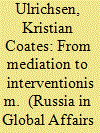

|
|
|
|
|
| Publication |
2013.
|
| Summary/Abstract |
During the first two years of the Arab Spring, Qatar's regional posture went into "overdrive," initially in Libya and subsequently in Syria. The country took advantage of the unique niche which it had spent years crafting in order to play an astoundingly high-profile and increasingly controversial role in the uprisings. Initially, it displayed unprecedented regional leadership bordering on outright activism in responding to crises across the Arab world. This greater self-confidence reflected multiple factors, including (relative) domestic stability and a progressive form of governance, as well as the ability to take and execute decisions quickly and the aforementioned experience in mediation. As a result, at the onset of the Arab Spring protests across the Middle East and North Africa, Qatar boasted a distinctive combination of characteristics rare in the Arab world, including regionally and internationally recognized legitimacy, a relatively progressive stance towards governance, an ability to make swift policy decisions, and extensive experience in mediation. All of these factors positioned Qatar to assume an extraordinarily visible and interventionist role during the Arab Spring upheaval.
|
|
|
|
|
|
|
|
|
|
|
|
|
|
|
|
| 2 |
ID:
128433
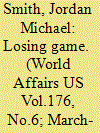

|
|
|
|
|
| Publication |
2014.
|
| Summary/Abstract |
The sentiments of Truman's State Department toward the Middle East are well documented. Hugh Wilford's engaging new book convincingly explores similar sentiments in the early CIA. One of the most famous anecdotes of the Truman administration was first revealed by presidential adviser Clark Clifford in his memoirs. Secretary of State George Marshall and his undersecretary were called into the Oval Office to debate with Clifford the merits of recognizing Israel. After Clifford argued in favor of Israel, Marshall, whom Winston Churchill called the "Organizer of Victory" for his role as army secretary during World War II, made what Clifford called "the most remarkable threat I have ever heard anyone make directly to a president." Said Marshall to Truman: "If you follow Clifford's advice and if I were to vote in the election, I would vote against you. Marshall's stunning comment reflected the viewpoint of "almost every member of the brilliant and now legendary group of presidential advisers, later referred to as the Wise Men, who were then in the process of creating a postwar foreign policy that would endure for more than forty years," recalled Clifford. Those advisers included such luminaries as George Kennan, Dean Acheson, Dean Rusk, and Charles Bohlen. They were later dubbed the "Arabists" because they believed that the Arabs could be allied with America after World War II-and should be courted instead of Israel.
|
|
|
|
|
|
|
|
|
|
|
|
|
|
|
|
| 3 |
ID:
122676


|
|
|
|
|
| Publication |
2012.
|
| Summary/Abstract |
I believe that given the effort of our mission a great number of civilian causalities have been avoided, and in fact, indeed we have avoided the human catastrophe. Our success will become obvious to all the road to operations unified protector (OUP) has been between our first days on the 31st March to today.
|
|
|
|
|
|
|
|
|
|
|
|
|
|
|
|
| 4 |
ID:
125303
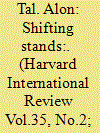

|
|
|
|
|
| Publication |
2013.
|
| Summary/Abstract |
While the Middle East is frequently in the news because of political volatility and violence, there is an underlying lack of environmental equilibrium that poses a comparable threat to regional stability. Israel's neighbors--Egypt, Jordan, and Palestine--are arid countries with limited natural carrying capacity and burgeoning populations. Providing food and employment in what were traditionally agrarian economies has contributed to significant depletion of soil and water resources. Israel's experience as an innovator in technologically intensive dryland agriculture and forestry is entirely different. Yet it is not clear whether the grand Israeli experiment in water management and combating of desertification offers a compelling alternative model to its neighbors should diplomatic breakthroughs pave the way for transboundary cooperation. Not only are the socioeconomic and cultural circumstances entirely different, but the sustainability of some of Israel's unique management practices remains questionable.
|
|
|
|
|
|
|
|
|
|
|
|
|
|
|
|
| 5 |
ID:
180690
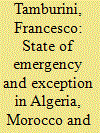

|
|
|
|
|
| Summary/Abstract |
This paper shows how the constitutional provisions related to the state of emergency and exception, although they are contained within democratic traditions, were set to operate in Algeria, Morocco and Tunisia as a mechanism of basic control and maintenance of liberal autocracies. The state of emergency model was used for the survival of regimes in times of instability and social unrest, leading in some cases to the suspension of human rights for many years. Nevertheless, these provisions were modified or lifted when the regime had to show a more convincing stake to the democratic process in 2011.
|
|
|
|
|
|
|
|
|
|
|
|
|
|
|
|
| 6 |
ID:
124267
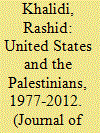

|
|
|
|
|
| Publication |
2013.
|
| Summary/Abstract |
This essay, based on the author's talk presenting a recent book, Brokers of Deceit: How the U.S. Has Undermined Peace in the Middle East, examines the dynamics of U.S. policy formation on Palestine, mainly through the lens of three "clarifying moments" in the history of U.S. involvement in the Arab-Israeli conflict. The first of these moments concerns efforts to revive and modify the Palestinian autonomy provisions of the 1978 Camp David Accords as an element of the 1982 Reagan Plan. The second examines Israeli-U.S. connivance during 1991-93 Madrid/Washington Palestinian-Israeli negotiations as revealed in confidential documents, and the third focuses on President Barack Obama's retreat during the second half of his first term from positions staked out earlier. More generally, the essay looks at the underpinnings and continuity of U.S. policy and how it has evolved.
|
|
|
|
|
|
|
|
|
|
|
|
|
|
|
|
|
|
|
|
|